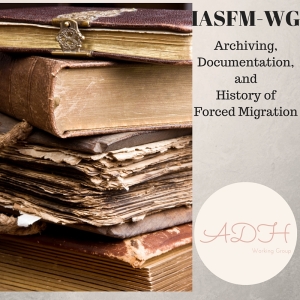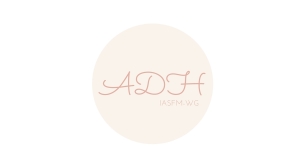We are very pleased to annouce the launch of the:
IASFM Working Group for Archiving and Documentation of History of Forced Migration
Coordinator: Paul Dudman
(Archivist at the University of East London, responsible for the Refugee Council Archive).
Co-Coordinator: Dr. Rumana Hashem
(Post-doc Researcher, affiliated with the Centre for Migration, Refugees and Belonging (CMRB) at the University of East London.
Terms of Reference for the IASFM Working Group Forced Migration Archives, Documentation and History.
Statement of Purpose:
The purpose of this Working Group will be to serve as a focal point for members of the IASFM interested and/or working in within the fields of forced migration archives e.g. documentation, preservation and researching the history of forced migration.
Proposed Activities:
 The proposed Working Group seeks to document and preserve original history of forced migration at both national and international levels. We would like to generate new partnerships and networking opportunities for developing forced migration archives and for helping with the creation of knowledge on, and the collection, documentation and preservation of forced migration history. We recognise that there is a need to work on how knowledge in the field of forced migration is created/ produced and maintained. Our aim for this Working Group, therefore, will be to bring together researcher, academics, librarians, archivists, activists, advocates (i.e.NGOs) who are either interested in the history of forced migration and related fields, or are interested in the care and preservation of the archival and library collections that help to preserve the often hidden voices of the migration journey. With a focus on networking on history of forced migration, we will also address the growing critique of the divide between experts and forced migrants themselves. We would like to take steps to ensure that the documentation of testimonies associated with the migration journey are actively preserved.
The proposed Working Group seeks to document and preserve original history of forced migration at both national and international levels. We would like to generate new partnerships and networking opportunities for developing forced migration archives and for helping with the creation of knowledge on, and the collection, documentation and preservation of forced migration history. We recognise that there is a need to work on how knowledge in the field of forced migration is created/ produced and maintained. Our aim for this Working Group, therefore, will be to bring together researcher, academics, librarians, archivists, activists, advocates (i.e.NGOs) who are either interested in the history of forced migration and related fields, or are interested in the care and preservation of the archival and library collections that help to preserve the often hidden voices of the migration journey. With a focus on networking on history of forced migration, we will also address the growing critique of the divide between experts and forced migrants themselves. We would like to take steps to ensure that the documentation of testimonies associated with the migration journey are actively preserved.
The Working Group is, however, devoted to develop a cross-spectrum approach to the management and preservation of important archival, library and related collections of materials. We also have a strong commitment to the use of oral history to help fill in the gaps which often exist within the more traditional archival collection. In this age of financial austerity, we are fully aware of the dangers posed to efforts that help to preserve the historical legacy of often marginalised group.
The proposed activities of the Working Group include organizing one panel on a topic related to archiving and documenting the history of forced migration at the IASFM conference 2016. The members of the Working Group will share information on archive and history related research findings on forced migration and refugee experience in the UK and elsewhere; assist members with access to published and unpublished material; actively encourage networking and promote collaborations and partnerships; share details on funding and develop jointly implemented funded activities; present conference papers, carry out combined publications in 2016 on, build capacity of the group; maintain a public facing portal providing research based information to interested outsiders; and provide feedback to each other concerning working papers and work in progress. The coordinators for the group will maintain records of the activities as they take place.
Possible Objectives
These might include:
- Actively promoting an interest in the history and archives of refugee, migrant and displaced communities
- Raising awareness and promotion of the value, relevance and importance of `refugee archives’ for education, research, history, heritage and community
 engagement.
engagement. - Enhancing collective knowledge of existing `refugee archives’ through the media, the internet and Social Media.
- Encouraging the creation of new `refugee archives’ where they have not previously existed, either in physical or digital media. Especially in relation to community archives, oral histories and life narratives.
- Encouraging high standards of collection care and long-term preservation of `refugee archives.’
- Enhancing networking opportunities for the exchange of information between archivists, librarians, researchers, practitioners, NGO’s, “refugees” and members of the public, including opportunities for virtual and physical networking.
- Working towards developing and enhancing the UNHCR International Thesaurus of Refugee Terminology. (Link: http://www.refugeethesaurus.org/hms/home.php?publiclogin=1)
- Collaboration with other national and international bodies as required, e.g. UNHCR, IOM, and other global human rights organisations in the field of forced migration.
Social Media
We have developed some initial social media content including a Twitter account and a Facebook page. Websites will be forthcoming in due course. Further details are as follows:
* Twitter: @ADHFM_WG
* Facebook Group: https://www.facebook.com/groups/901449256599318
* Website: www.iasfm.org/adfm/


You must be logged in to post a comment.